The future of electric vehicles in India is in a great position because of the increasing preference of customers towards EVs over ICE vehicles and the indigenous manufacturing of EVs and related components, aided by GOI incentives.
India is currently witnessing the largest shift in the mobility pattern from ICE vehicles to sustainable electric mobility due to rising fuel prices, Government’s push for electrification, and the urgent need to combat climate change.
In this article, we will explore the Future of electric vehicles in India, backed by data and facts. We will discover how government and EV companies are collaboratively working for the change.
Current Scenario of the Electric Vehicle Industry in India
India’s electric vehicle market has experienced significant growth in recent years, driven by a combination of factors such as government initiatives, increasing environmental consciousness, and technological advancements in the EV sector.
In FY 2023, there’s an exponential rise in the demand for electric vehicles with over 1 million units in annual EV sales for the first time ever. It is by far the highest annual growth in any developing country.
The electric vehicle industry in India grew by 173% in FY2022-2023 with 1,181,600 million units in overall EV sales, compared to the sales figure of 4,57,346 units during FY2021-FY2022.
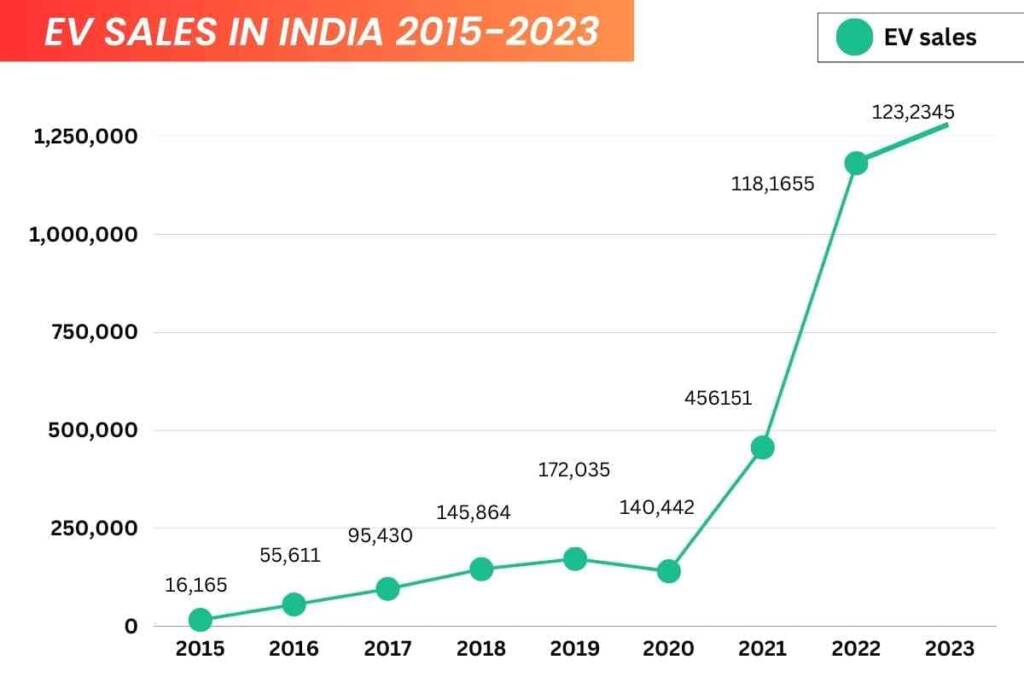
In FY2023, electric two-wheelers dominate the EV market in India, accounting for nearly 90% of total EV sales, contributing majorly to the overall growth of EVs in India. The electric two-wheeler segment in India grew by 185% in FY2023 with 1,04,744 units in sales compared to 39,438 units in FY2022.
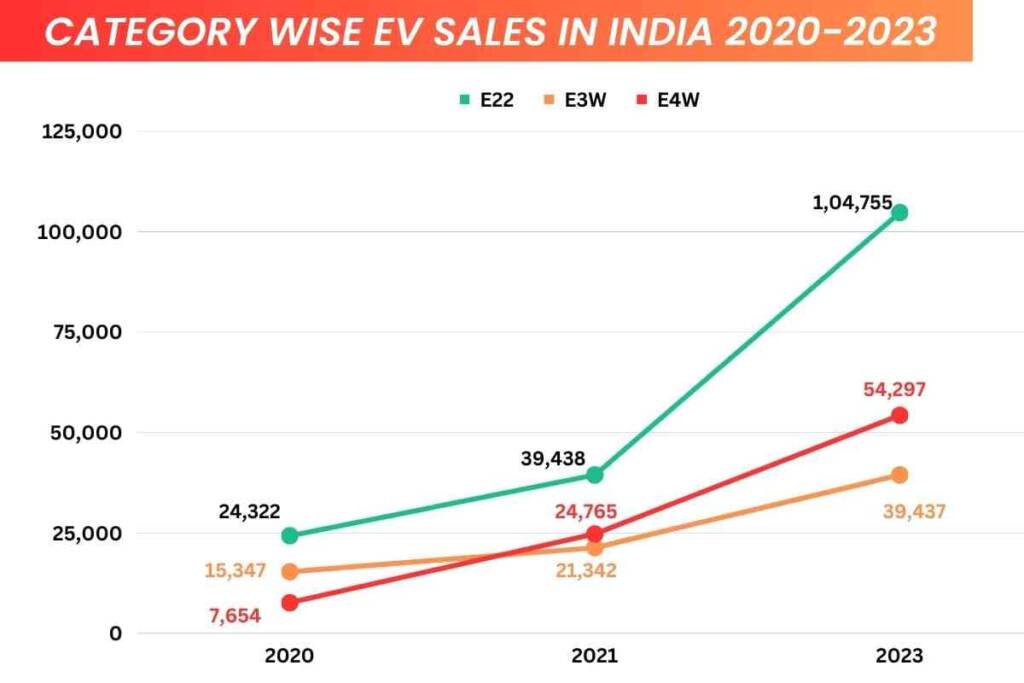
For the first time, E2W sales crossed 1 lakh units in a single month in India in May 2023. Ola Electric is currently leading the electric 2W segment in India, followed by TVS Motors and Ather.
Total electric cars in India grew by 155% in 2023 with 54,297 units till June 2023. Tata Motors is leading the electric four-wheeler segment with 8,674 electric cars on-road, followed by MG Motors.
Category-wise share of total electric vehicle sales in India till June 2023:
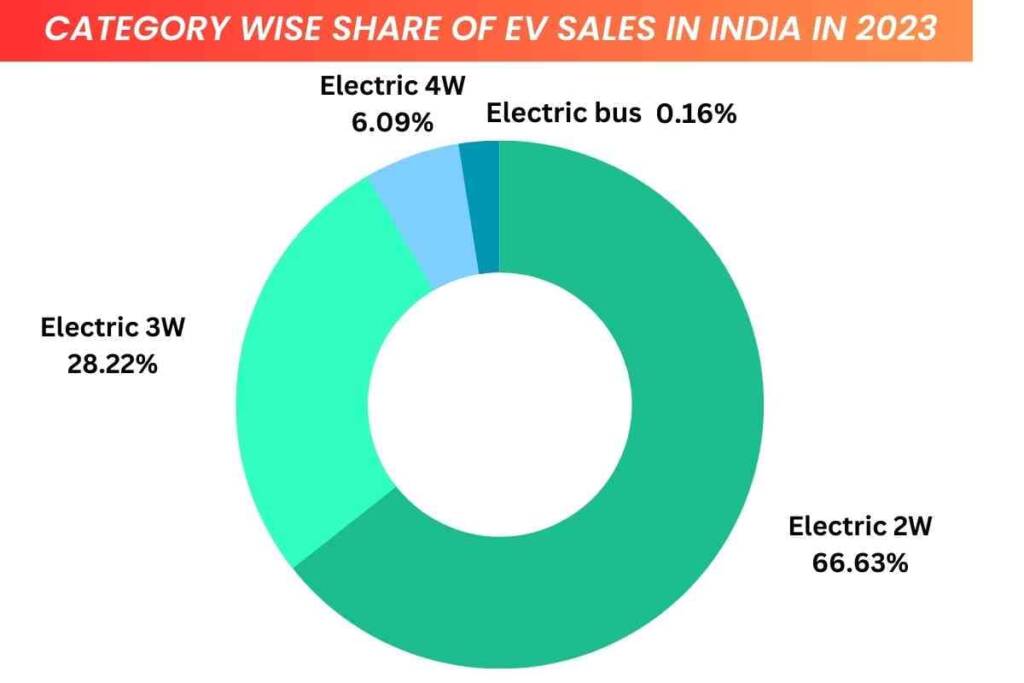
| Category | Market share |
|---|---|
| Electric two-wheelers | 61.29% |
| Electric three-wheelers | 28.22% |
| Electric cars | 6.09% |
| Electric bus | 0.16% |
Total Number of electric vehicles across different Indian states in 2023:
| State | Electric Vehicle Sales in 2023 |
|---|---|
| Uttar Pradesh | 38,187 units |
| Maharastra | 30,974 units |
| Karnataka | 23,351 units |
| Gujarat | 16,852 units |
| Tamil Nadu | 15,686 units |
| Rajasthan | 13,197 units |
| Kerala | 12,229 units |
| Bihar | 10,829 units |
| Delhi | 10,524 units |
| Assam | 9,108 units |
NOTE: Total sales figures include electric three-wheelers, electric two-wheelers, electric cars, and other battery-powered vehicles.
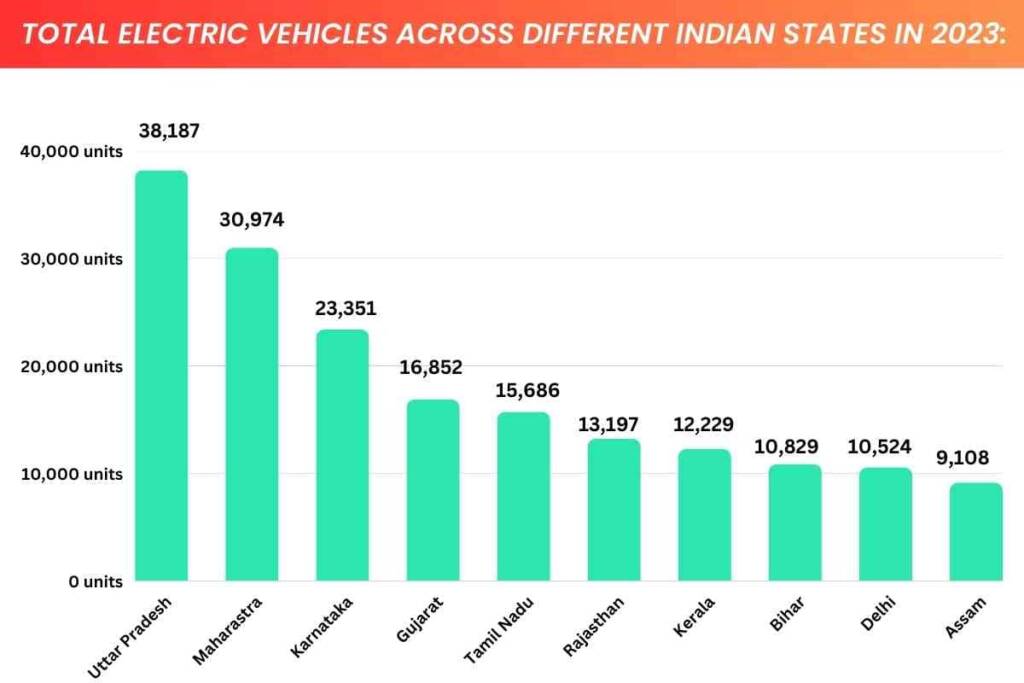
Uttar Pradesh is leading the overall EV sales in India having a 14.06% market share at 38,187 units in 2023, followed by Maharastra at 14% with 30,974 units.
Indian EV market witnessed a significant decline in EV sales during the lockdown imposed due to the Covid-19 pandemic. However, the overall EV sales remained unaffected with 110% growth during FY2019-2020 in India.
With a vision to develop the EV charging infrastructure, several state governments have signed MoUs with electric vehicle charging station startups to install public DC fast charging stations.
According to the CEEW Centre for Energy Finance, there are around 1,586 DC fast charging stations in India as of June 2023.
Considering the current scenario of the electric vehicle industry in India, we can expect a promising electric vehicle future in India.
Future of Electric Vehicles in India: Projected Growth
The electric vehicle industry in India is growing exponentially over the years, giving EV buyers and electric vehicle manufacturers enough time to understand the new technology and work on their R&D.
Considering the EV revolution, several government and non-government organizations have rolled out several growth projections which indicate a promising future for EVs in India.
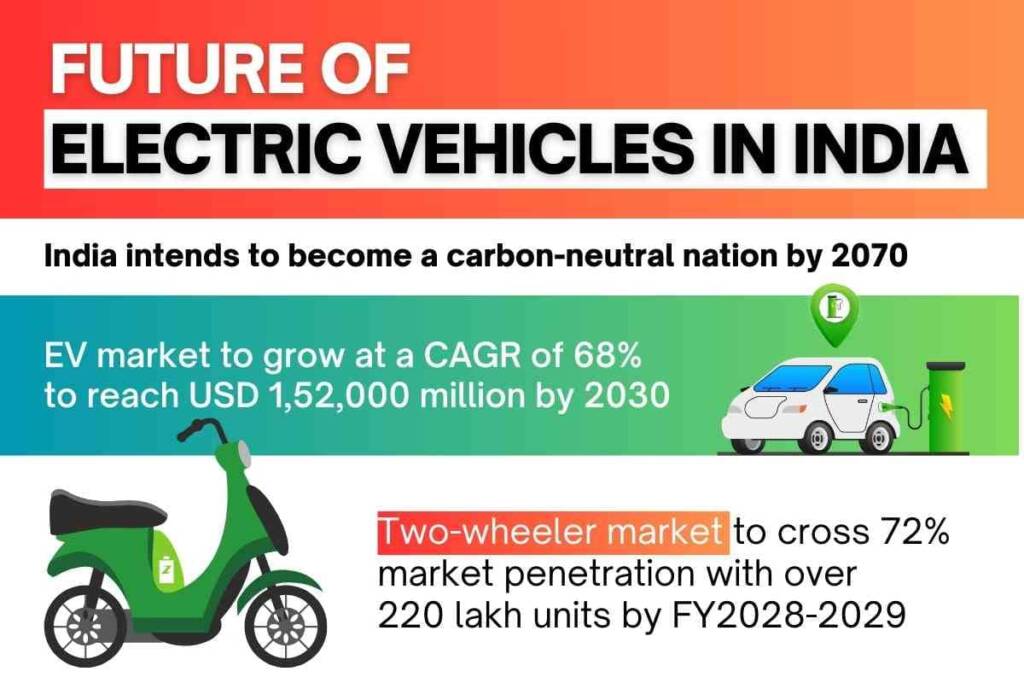
Notable growth projections:
- The electric vehicle market size in India is expected to grow at a Compound Annual Growth Rate (CAGR) of 68% from 2022-2030.
- The Indian electric vehicle market size of USD 4,230 million in 2023 is expected to grow at a CAGR of 68% to reach USD 1,52,000 million by 2030.
- The government of India’s policy think tank – Niti Ayog and RMI expects 80% EV sales penetration for electric two-wheelers and three-wheelers, 50% for four-wheelers, and 30% for buses by FY2030.
- Bound by international commitments, India intends to become a carbon-neutral nation by 2070.
- Segment-wise, India is expected to reach overall EV sales penetration of 30% of private vehicles and 70% of commercial vehicles.
- According to the report published by Niti Ayog and TIFAC on electric two-wheelers market penetration, it is expected that the two-wheeler market will cross 72% market penetration by 2031, with total sales crossing over 220 lakh units by FY 2028-2029 in India.
- The BEV segment is expected to grow at a CAGR of 110% over the FY2021-2030, while the PHEV is expected to grow by 95%, as reported by JMK Research.
India is a price-sensitive market with customers looking for affordable electric vehicles. During the early days of EV adoption in India, electric vehicles very very costly due to imported batteries.
However, the indigenous manufacturing of EV batteries and EV parts has significantly reduced the electric vehicle price in India.
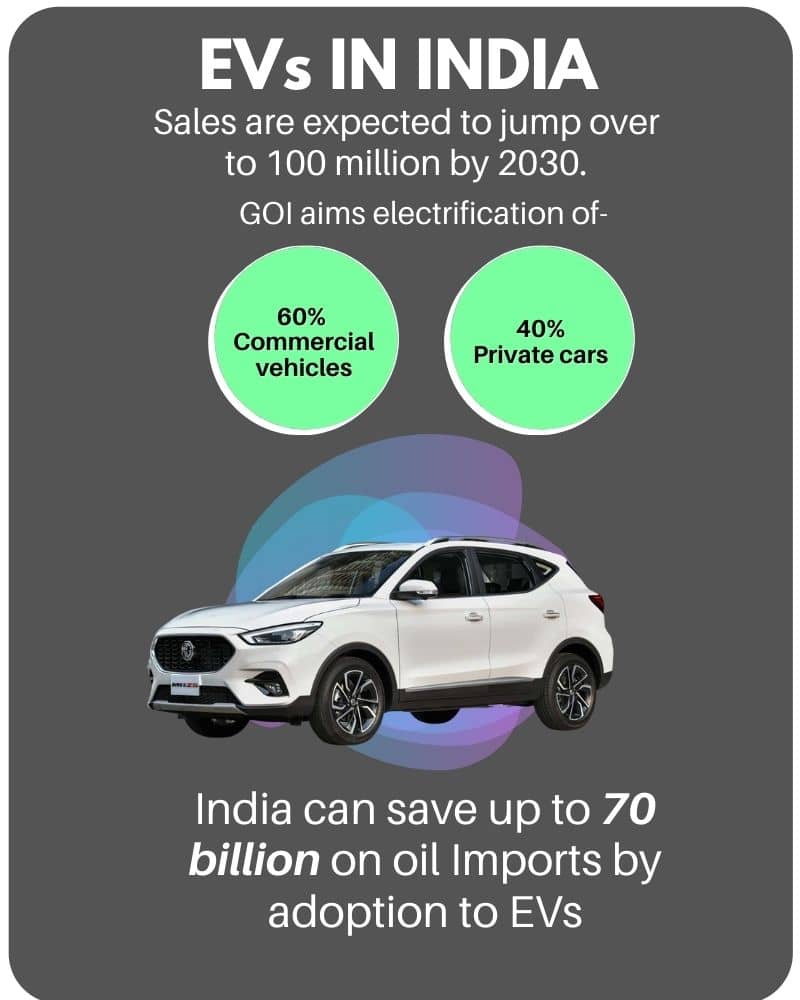
Micro-mobility in India is on the rise with several affordable two-wheelers options to choose from. These mass-market electric vehicles are expected to contribute heavily to the growth of the EV market size in India by 2030.
To achieve these projected growths for the future of electric vehicles in India, the Government of India has rolled out several EV policies and schemes to incentivize buyers and manufacturers.
Government Initiatives and policies promoting EVs
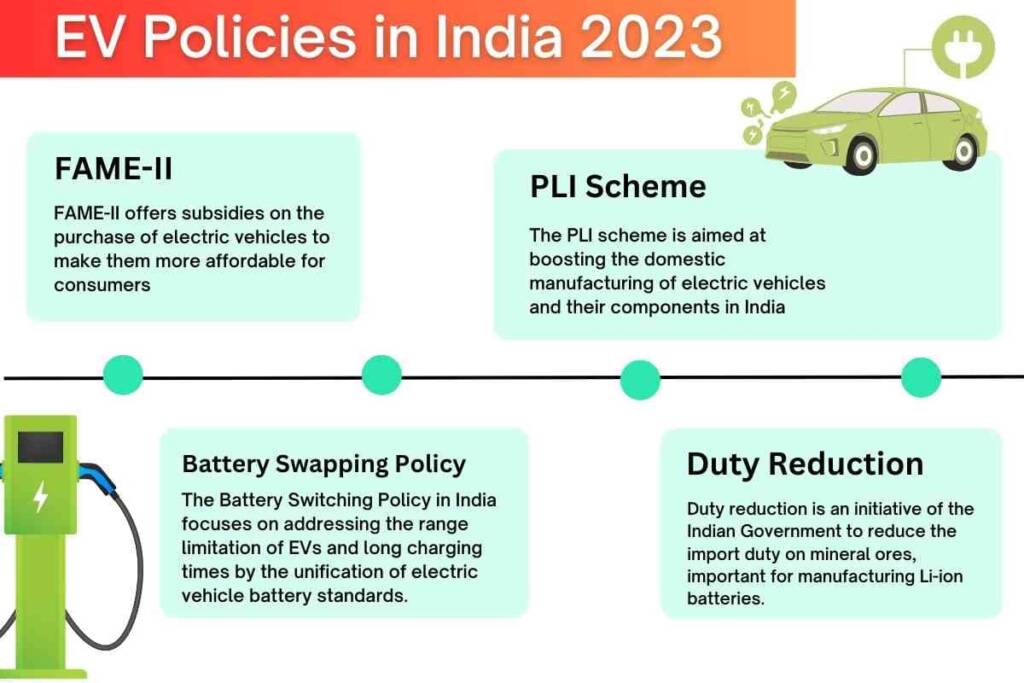
The government of India has introduced several EV policies and schemes to accelerate the adoption of electric vehicles in India. These central and state EV policies are in line with the Government’s ambitious goal of 100% EV penetration by 2030. Let’s understand them in detail:
FAME-II
FAME-II is an Electric vehicle scheme launched by the Indian government on April 2019 to promote the adoption and manufacturing of electric and hybrid vehicles in India. The scheme was introduced with a budget of Rs 10,000 crore to support and incentivize 500,000 electric three-wheelers, 7,000 electric buses, 55,000 electric passenger vehicles, and 1 million electric two-wheelers.
FAME-II offers subsidies on the purchase of electric vehicles to make them more affordable for consumers and encourages the establishment of charging infrastructure across the country, likely to extend till March 31, 2024.
Latest Update: A new notification was issued by the Ministry of Heavy Industries (MHI) to be effective from June 1, 2023, for revising the per kWh incentive on Electric two-wheelers. According to latest notification for FAME II, the demand incentive is reduced from Rs 15,000/kWh to Rs 10,000/kWh, while the incentive caping is reduced from 40% to 15% of the price of the vehicles.
PLI Scheme (Production Linked Incentive Scheme)
The PLI Scheme is a government initiative launched by the Department of Heavy Industries on June 2021 with a project outlay of Rs 18,100 crore.
The PLI scheme is aimed at boosting the domestic manufacturing of electric vehicles and their components in India, for the production of affordable electric vehicles in India. Under this scheme, manufacturers receive financial incentives based on their sales of electric vehicles.
Battery Swapping Policy
The Battery Switching Policy in India focuses on addressing the range limitation of EVs and long charging times by the unification of electric vehicle battery standards.
This policy encourages the development of battery swapping stations for last-mile delivery sectors like e-commerce fleets and food delivery chains where waiting to charge EV batteries doesn’t make sense.
For EV users this policy would drastically reduce the downtime, while the rise in the sales of unified battery solutions will help battery manufacturers lower the costs of EV batteries.
Duty Reduction and E-mobility Zone
Duty reduction is an initiative of the Indian Government to reduce the import duty on mineral ores, important for manufacturing Li-ion batteries. Import duty on Nickel ores and Nickel Oxide is reduced to 0%, while the duty on Ferro Nickel is reduced from 15% to 2.5%.
This move will help EV battery manufacturers in India to lower the battery costs which will help to lower the overall price of electric vehicles.
The Special Electric Mobility Zone (SEZ) is a concept introduced by the Indian government to establish designated areas that will have the necessary infrastructure and facilities to support electric mobility, such as charging stations, battery swapping facilities, and other relevant services.
Apart from the central government policies and schemes, 70% of Indian states have rolled out their own EV policies to incentivize EV buyers, manufacturers, and infrastructure providers.
State-wise EV subsidies in India
Several state governments have rolled out their individual EV policies to incentivize EV buyers and manufacturers. Let’s have a look at them:
| State | Electric Scooter (per kWh) | Electric Car (per kWh) | Road Tax exemption |
|---|---|---|---|
| Delhi | Rs 5,000 | Rs 10,000 | 100% |
| Maharastra | Rs 5,000 | Rs 5,000 | 100% |
| Gujarat | Rs 10,000 | Rs 10,000 | 50% |
| Meghalaya | Rs 10,000 | Rs 4,000 | 100% |
| Assam | Rs 10,000 | Rs 10,000 | 100% |
| Bihar | Rs 10,000 | Rs 10,000 | 100% |
| West Bengal | Rs 10,000 | Rs 10,000 | 100% |
| Rajasthan | Rs 2,500 | No | No |
| Odisha | NA | NA | 100% |
| Uttar Pradesh | No | No | 75% |
| Kerala | No | No | 50% |
| Karnataka | No | No | 100% |
| Tamil Nadu | No | No | 100% |
NOTE: States with “No” represent that there is no direct subsidy.
Electric scooters Subsidy in India
Currently, Delhi provides the highest subsidy on electric scooters by offering a purchase incentive of Rs 5,000 per kWh capped at Rs 30,000, followed by Maharastra, which offers a subsidy of Rs 5,000 but capped at Rs 25,000.
Indian states such as West Bengal, Gujarat, Assam, and Meghalaya offer a subsidy of Rs 10,000 per kWh on the purchase of electric scooters, up to a maximum of Rs 20,000.
Electric scooter buyers are exempted from paying road tax in most of the states with effective EV policies.
Electric Cars Subsidy in India
For electric cars, Maharashtra currently offers the highest subsidy of Rs 5,000 per kWh, capped at Rs 2.50 lakh. While Delhi, Gujarat, Assam, Bihar, and West Bengal offer a subsidy of Rs 10,000 with a capping of Rs 1.5 lakh. Electric car buyers are exempted from paying road tax in most of the states with effective EV policies.
These government policies and subsidies have helped automotive giants as well as small startups for the R&D of EVs to bring forward a range of advanced technologies in India. Let’s have a look at some of them:
Innovations transforming the Indian EV industry:
Collaborative efforts of the Government, EV Giants, and EV startups have led to the development of new EV technologies, aimed at increasing the efficiency of EVs and reducing the overall price of electric vehicles in India.
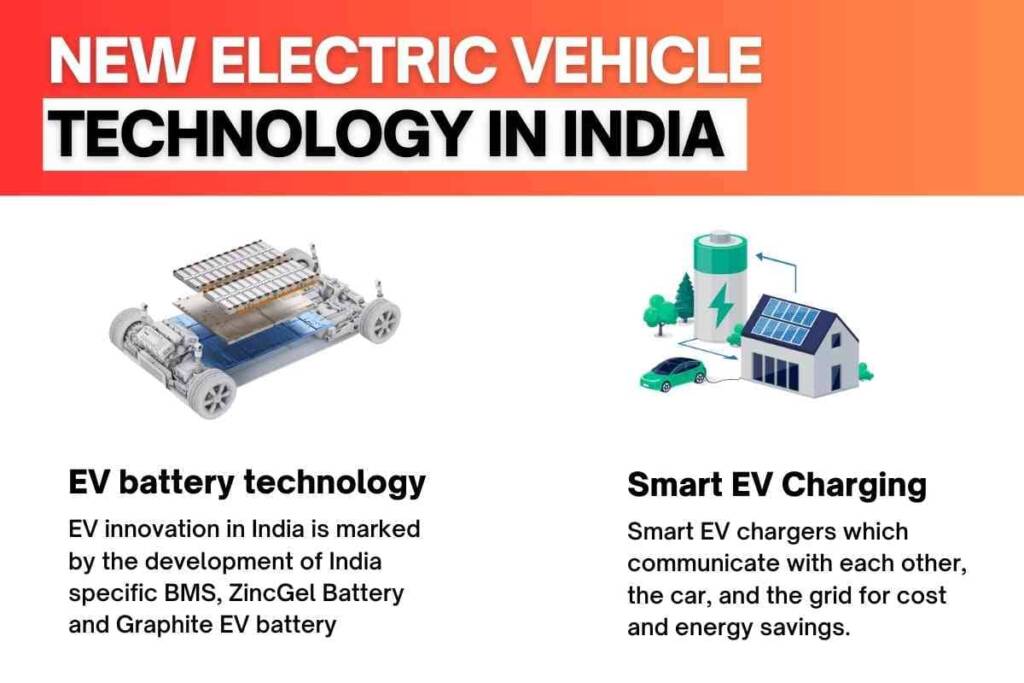
New EV battery technology
Many Indian startups and established battery manufacturers have developed and patented several battery technologies for electric vehicles.
Log 9 materials developed EV batteries with telematics for battery health and a Battery Management System specific to India’s climatic conditions.
Researchers from IIT Kanpur have developed ZincGel battery technology that neatly manages thermal stress and provides twice the efficiency compared to Li-ion batteries.
Earth Energy is believed to be developing graphite batteries for electric vehicles with greater energy density, while Odisha-based electric mobility startup EeVe uses two lithium ferrous phosphate (LFP) battery packs which increases the overall range.
Smart EV Charging:
Companies like ecocharger have developed smart EV chargers which communicate with each other, the car, and the grid for cost and energy savings. These chargers notify for a refill when the energy costs and demands are low. It helps EV drivers to benefit from cheaper electricity and reduces the load on the grid during demand hours.
These new technologies are mostly launched by EV startups, which play a great role in enhancing the future of EV in India.
Role of Electric Vehicle Startups
Indian electric vehicle startups have contributed significantly to the development of India’s electric vehicle sector through their innovative products, technology advancements, and a lineup of affordable EVs. EV startups in India have fast-forwarded the EV growth in India by bringing in 1100 million in funding in 2023.
Let’s understand the role of EV startups in accelerating the future of electric vehicles in India.
R&D of Electric Vehicles
Startups are known for their ability to innovate through extensive R&D. Indian startups are addressing the challenges in the Indian EV industry with their advancements in battery technology, charging infrastructure solutions, and software applications for EV management.
Manufacturing and Supply Chain:
Startups are collaborating with each other for mutual sharing of technologies to bring forward new affordable EV models to the market.
Many Indian EV startups started manufacturing components, batteries, or charging infrastructure equipment, thereby enhancing the domestic supply chain and reducing dependency on imports.
Charging Infrastructure Expansion
EV charger startups are accelerating the development of EV charging infrastructure by developing smart EV chargers which are cost-effective.
These chargers use artificial intelligence to reduce the pressure on grids during peak hours by smartly charging the parked EVs during low-demand hours.
Electric two-wheeler startups like Ola Electric and Ather contribute significantly for the adoption of EVs in India. The roll-out of cost-efficient electric scooters at a time when fuel prices are on the rise has shifted the consumer’s interest towards electric micro-mobility solutions. It is evident by the total sale of 1,04,700 units of electric two-wheeler by June 2023.
While electric four-wheeler startups like PMV offer affordable electric cars under 5 lakhs for the Indian market.
Electric Vehicle Opportunities in India
India’s EV revolution brings forward several ecological and business opportunities for India, at a time when the nation is struggling with environmental challenges and energy demands.
By embracing and capitalizing on this sustainable mode of transportation, India can unlock numerous economic, environmental, and social benefits. Here are some of the opportunities brought by the EV revolution in India:
Electric vehicle business opportunities in India
With the exponential rise in EV adoption, India stands at the transition of a significant business transformation.
The growth of the EV industry stimulates the economy through investments and innovation. According to the Ministry of Heavy Industries, India received an investment of around INR 1.43 lakh crore (approximately USD 19.35 billion) in the EV sector between 2014 and 2023.
The government’s push to promote electric mobility along with the technological advancements made by EV startups and EV giants have opened up several lucrative opportunities for entrepreneurs and businesses. Let’s understand some of them.
Charging station business opportunities
A robust charging infrastructure is needed to support the exponential rise of EVs in India. Entrepreneurs can tap into this opportunity by investing in charging station businesses in India.
India would require 63,000 charging stations by 2030 to support India’s growing EV market. According to a report published by Imarc, the Indian EV charging market is expected to grow at a CAGR of 10.5% during 2023-2038.
This business segment offers long-term revenue potential, especially with the government’s focus on expanding the charging infrastructure across the country.
EV battery business opportunities in India
Batteries are major components in an electric vehicle which comprise around 50% of the price of the vehicle. To lower the overall cost, Indian Government has rolled-out several policies (PLI Schemes) for indigenous manufacturing of these currently imported EV batteries.
Entrepreneurs can tap into the EV battery market for the R&D, manufacture, and marketing of Made in India EV batteries. Indian EV battery market is expected to grow at a CAGR of 11.5% during 2023-2028, to reach USD 10.6 billion market size by 2028.
Opportunities for electric vehicle conversion
Being the world’s third-largest automotive market, India has a vast number of ICE vehicles. For a price-sensitive market like India, converting the existing ICE vehicles to EVs using a retrofitting kit is a great alternative.
The EV conversion industry in India is expected to grow at a CAGR of 17.4% to reach USD 2.6 billion by 2030.
Entrepreneurs can set up conversion centers where ICE vehicles can be retrofitted with electric drivetrains and components. EV retrofitting combines sustainable transportation with cost-effectiveness, making it an attractive business proposition.
EV recycling business opportunity.
Electric vehicles contain valuable materials such as lithium-ion batteries, electric motors, and electronic components. Entrepreneurs can venture into the EV recycling business, which involves the safe and responsible extraction and recycling of these components.
Startups can refurbish and resell reusable parts in EV batteries, contributing to a circular economy within the EV industry.
Delivery fleet operators
The EV revolution in India marked by the launch of battery swapping policy is an excellent opportunity for last-mile delivery companies like ecommerce and food delivery sectors. These companies can electrify their delivery fleets to cut down on fuel costs, thereby saving enormous amounts of money.
Ecological Opportunities in India
One of the most significant advantages of EVs is their potential to reduce air pollution and greenhouse gas emissions. India is currently battling severe air pollution, majorly contributed by ICE vehicles.
EV adoption in India brings in an opportunity to enhance the climate index of India by cutting down on tailpipe emissions, significantly improving air quality, and reducing carbon footprints.
This, in turn, can enhance public health, reduce the stress on healthcare systems, and lead to a healthier and more sustainable environment for all.
Electric vehicle job opportunities in India
According to Niti Ayog, the growth of the EV sector in India is expected to create 10 million job opportunities by 2030 in various segments such as vehicle manufacturing, charging infrastructure, battery manufacturing, and R&D of EVs.
This growth of EVs in India would not only create jobs but also attract significant investments from domestic and international players, leading to technological advancements and overall economic development.
Considering the opportunities created by EV adoption in India, the future of electric vehicles in India is quite promising, but it also comes with a set of unique challenges.
Challenges of electric vehicles in India
The transition to the Electric vehicle ecosystem is happening at a rapid scale in India. However, the largest shift in the mobility pattern has its own set of challenges to overcome. Below we have highlighted some of the challenges for electric vehicles in India along with their solutions:
Incomplete Standardization
State and central governments have rolled out several policies for the proliferation of the EV charging and battery industry between 2014-2023. However, there is still some standardization that needs to be in place for the streamlined progress in respective sectors.
The lack of standard EV charging rates has created a monopoly in the EV charging market. GOI needs to set standard EV charging rates pan India or even on the state level, after considering the state-wise EV tariffs offered to Charging Point Operators, mentioned in the state EV policies.
The lack of unification in the EV battery standards is hindering the growth of the battery swapping industry in India. This issue needs to be addressed very quickly to achieve the goals mentioned in the Battery Swapping Policy of India, launched back in April 2022.
Due to the incomplete standardization in the charging industry, there’s limited development of charging infrastructure, as CPOs are waiting for complete SOPs from the Government.
Limited Charging Infrastructure
Limited development of EV charging infrastructure is one of the key challenges that is hindering the growth of electric vehicles in India. In a survey conducted by us among customers interested to buy electric vehicles in India, their main concern was the inadequate EV charging infrastructure of India.
Currently, in June 2023, there are around 1,586 DC charging stations, located primarily in urban areas. These numbers are not enough to support the growing EV market in India.
Addressing the issue of charging infrastructure requires significant investment, along with a strong collaboration between the government, private sector, and charger manufacturers.
Being a Charge Point Operator, we realized that the lack of transformers and additional power is one of the major barriers that is hindering EV charger installations.
High Initial Cost
The initial cost of owning an electric vehicle in India is comparatively higher than their ICE counterparts due to the imported EV components and batteries. For a price-sensitive country like ours, higher electric vehicle prices are a big challenge to overcome.
However, with the rise in the indigenous manufacturing of EVs and related components, the price is decreasing gradually, making EVs more affordable in India.
Lack of Grid upgrades
Current power grids are not adequate to handle the increased power demands from EV charging stations and home EV chargers.
Also, the ongoing power generation method by burning coal nullifies the benefit of EV adoption, as it involves significant carbon emissions.
These challenges can be addressed by deploying bidirectional smart grid solutions, renewable energy integration for clean energy generation, and battery energy storage systems for managing power demands.
Limited R&D in EV technology.
EV technology is new in India so the R&D is quite limited. Since EV components and batteries are mostly imported, they come with technology tested and approved for the manufacturer’s country, which may or may not work for India. This is the reason for EV fire incidents that took place in 2022.
From vehicles to EV batteries, extensive R&D and testing should be made mandatory before the product hits the market.
Lack of Skilled Workforce and Training
Currently, India lacks a workforce that is well-skilled to support the growing EV industry. Since EV technology is new, repairing an EV in India is a herculean task. Very few service centers in India have technicians skilled in EV repair.
Technical institutions should promote skill training programs in battery manufacturing, vehicle assembly, charging infrastructure installation, maintenance, and repair.
By with a vision to address these challenges and taping the right opportunities, many EV startups in India are transforming the EV landscape in India. Let’s understand it through a case study of Ola Electric.
Case Studies and Success Stories
Real-life case studies and success stories provide valuable insights into the transformative power of electric vehicles, indicating a bright future for electric vehicles in India. Let’s understand with an example:
Ola Electric: Ola Electric, an Indian electric mobility startup, aims to revolutionize the electric two-wheeler market with its innovative products and charging solutions. The company has set up a massive EV manufacturing facility in Tamil Nadu, with a projected capacity of 10 million vehicles per year.
During the onset of the EV revolution in India, Ola Electric launched electric scooters with the most advanced features and specifications to date. Ola Electric invested a hefty amount in the R&D of electric micro-mobility in India, which resulted in a versatile and affordable electric scooter – Ola S1 and S1 Pro.
Taping into the market at the right time and bringing in some state-of-the-art technology, led the Ola electric scooter sales to skyrocket, days after its launch.
Till the first quarter of FY2023, Ola Electric sold more than 2 lakh electric scooters with a market share of 30%.
Conclusion
In conclusion, the future of electric vehicles in India is on the right track because of the joint initiatives of the Government sector and EV startups, advancements in EV technology, consumer awareness, and decreasing EV prices. The EV transition in India brings various socioeconomic and environmental benefits leading to cleaner air, job creation, energy, security, and economic growth. If all these factors work in sync, the EV industry in India will grow by folds in the upcoming years.
See the FAQ section to understand the future of electric vehicles in India through commonly asked questions below.
FAQ
The future of electric vehicles in India looks promising with the government’s push for sustainable transportation and increasing awareness about environmental concerns. The electric vehicle sector in India is set to cross USD 1,52,000 million by 2030. Adoption of EVs will save up to 70 Billion on oil imports.
India’s transition to a carbon-neutral nation by 2030 is hindered by some challenges such as inadequate charging infrastructure, high initial costs, and lack of R&D. However, Government initiatives and manufacturers are bringing in innovative solutions to address these challenges.
Electric vehicle adoption plays a significant role to enhance the climate index of India. By producing zero tailpipe emissions, they help reduce air pollution and improve overall air quality. However, it’s important to address the issue of lack of clean energy.
The adoption of electric vehicles in India brings in a wide range of opportunities for India. EV adoption creates business opportunities, job opportunities, and opportunities to enhance the climate index of India.
The Electric Vehicles industry in India is in a state of rapid transformation now. Charging stations are being installed in major cities, along highways, and in public spaces. The government, along with private players, is actively investing in expanding the charging network to ensure convenient access for electric vehicle owners.
Indian Government plays a crucial role for EV adoption in India with the launch of various EV policies and initiatives for electric vehicle buyers and manufacturers. The issue of range anxiety and affordability is taken care of by offering support to major startups and manufacturers.
Owning an electric vehicle in India comes with several advantages. They offer lower operating costs, reduced dependence on fossil fuels, minimal maintenance requirements, and a smoother driving experience. Additionally, electric vehicles contribute to a cleaner and greener environment by reducing carbon emissions.
Yes, India is already making a major transition to electric mobility with the launch of several EV policies such as FAME II and the National Electric mobility mission.
Many state governments in India have launched their respective EV policies for incentivizing EV buyers. Currently, Delhi offers the highest subsidy on electric vehicles at Rs 5,000 per kWh of battery capacity, followed by Maharastra at Rs 10,000 per kWh.
Electric Vehicles are currently on the pricier side in India due to the imported batteries. However, indigenous manufacturing by startups has led to the launch of affordable electric cars in India, under 5 and 10 lakhs.

great
Hi,
I want to know about the business opportunity i.e initial investment, profit margin and total space required.
Hello Mr Abhinav Dubey,
Glad you expressed your interest in setting up EV charging station.
Here are the reply to your queries:
– The initial investment to set up EV charging station in India is Rs. 11 lakhs.
– The net profit from an EV charging station in Rs 9 lakhs yearly.
– Space required to set up EV charging station is approximately two hundred square feets.
Regards Ecogears